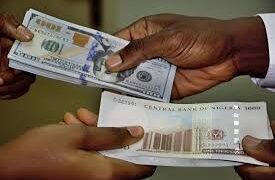The Comptroller-General of the Nigeria Customs Service (NCS), Adewale Adeniyi, has issued an important directive concerning the auction of seized petrol in Adamawa State, setting the price at N630 per litre.
This announcement was made during a press conference held on Wednesday, October 9, 2024, in Yola, the capital of Adamawa State.
The Comptroller-General, represented by the Deputy Comptroller-General of Customs (DCG), Aliyu Alajogun, also highlighted the strides made by Operation Whirlwind, an initiative aimed at curbing the smuggling of petroleum products across the country.
During the press briefing, Alajogun disclosed that Operation Whirlwind has achieved notable success, particularly in its efforts to combat fuel smuggling in the region.
He reported that customs officers had successfully seized two lorries loaded with a large quantity of smuggled petroleum products. These included 1,046 kegs filled with Premium Motor Spirit (PMS) and 12 drums of other petroleum products.

As part of the government’s measures to ensure that the seized fuel products do not go to waste, the Comptroller-General announced that the seized petrol would be immediately auctioned at two petrol stations in Yola at the rate of N630 per litre.
This move is designed to ensure that the seized products are made available to the public at an affordable price, while also sending a clear message to those involved in illegal fuel smuggling operations.
He said, “Our ongoing operations have recorded substantial seizures in various locations, including the North-West borders in the Sokoto-Kebbi axis, the South-West borders around the Seme-Badagry and Idiroko axis, and the southern borders in Cross River and Akwa Ibom states.”
“I am pleased to announce that in this latest phase of Operation Whirlwind, we have seized two lorries carrying smuggled petroleum products, 1,046 kegs filled with PMS, and 12 drums of petroleum products.
Additionally, one suspect has been apprehended in connection with these smuggling activities,” he added.
This recent seizure by the Nigeria Customs Service underlines the ongoing challenges faced by the country in tackling fuel smuggling, particularly in border areas where illicit activities often thrive.
The Customs Chief emphasized that these seizures are a testament to the relentless efforts of the NCS to safeguard the country’s resources.
He also reiterated the commitment of the service to ensuring that fuel smuggling is dealt with decisively, warning individuals engaged in these illegal activities that they would face the full force of the law if caught smuggling the nation’s resources.
Adeniyi further urged Nigerians, especially those residing in Adamawa and other border states, to support the customs operations by being vigilant and cooperating with the authorities.
He emphasized that the fight against fuel smuggling cannot be won by the authorities alone and called for community involvement in protecting national resources.

According to him, the active participation of citizens is crucial to ensuring that the benefits of fuel price deregulation are fully realized by all Nigerians and that the country’s resources are not siphoned off through smuggling.
Smuggling of petroleum products has long been a challenge for Nigeria, particularly in the years before the deregulation of the downstream oil sector.
Neighboring countries such as Niger, Cameroon, and the Benin Republic have been destinations for smuggled Nigerian fuel, exacerbating the burden of fuel subsidies on the Nigerian government.
While Nigerians paid heavily for subsidized fuel, foreigners in these neighboring countries enjoyed the benefits at Nigeria’s expense.
In June 2024, the Nigeria Customs Service took decisive steps to combat this illegal trade, leading to the shutdown of up to 1,800 petrol stations in the Northeast.
This action was part of a larger crackdown on petrol smuggling, with customs targeting fuel marketers suspected of involvement in these illegal operations.
Recent data from the Nigerian Midstream and Downstream Petroleum Regulatory Authority (NMDPRA) shows a drop in the country’s daily average fuel consumption following the removal of fuel subsidies.
Before the subsidy removal, Nigeria’s daily fuel consumption stood at 66.9 million litres, but this has now decreased to 48.4 million litres. This reduction in fuel consumption has been accompanied by a drop in fuel imports.
According to S&P Global Commodities Insights, Nigeria’s fuel imports fell to 106,000 barrels per day (bpd) in July 2023, compared to 205,200 barrels per day in May 2023.
The reduction in both consumption and imports is indicative of the changing dynamics in Nigeria’s oil sector, which has been reshaped by the deregulation of the downstream market and the intensified efforts of customs to combat fuel smuggling.
The actions of the Nigeria Customs Service, particularly through initiatives like Operation Whirlwind, are playing a critical role in protecting the country’s resources and ensuring that the benefits of deregulation are not undermined by illegal smuggling activities.
The auction of seized petrol at a price of N630 per litre is one of the immediate measures taken by the NCS to ensure that confiscated fuel is put to good use while also addressing the problem of fuel scarcity in the region.
This development is a clear indication of the NCS’s commitment to upholding the law and safeguarding the country’s resources from those who seek to exploit them for personal gain.
As the fight against fuel smuggling continues, the NCS remains determined to bring all offenders to justice and to ensure that Nigeria’s fuel supply remains secure and available to its citizens.



































